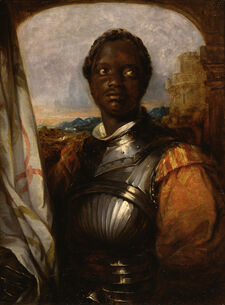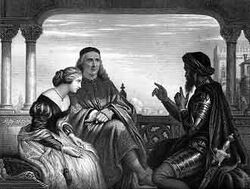
African-American actor Ira Aldridge (1805-1867) as Othello. Oil painting by William Mulready (1786-1863).
The Tragedy of Othello, the Moor of Venice, usually referred to simply as Othello is a play by William Shakespeare. Its earliest recoreded performance was on November 1, 1604 and it is believed to have been written in 1603. It was first published in book form in 1622, six years after Shakespeare's death. It was published again in a slightly different form in the First Folio, the first collected edition of the complete works of Shakespeare, in 1623.
The main character, Othello is a Moor, a black African, who, at the beginning of the play, has already been a soldier for many years and has become a captain in the army of the Italian city-state of Venice. Shortly before the start of the play, Othello has married Desdemona, the young daughter of a prominent Venetian politician. The main antagonist of the play is Iago, a soldier who serves under Othello. He has come to hate Othello because he chose to promote a younger soldier, Michael Cassio, instead of him. He plans to take revenge on Othello and Cassio by getting the jealous Othello to believe that his wife and Cassio are lovers. Other characters in the play include Iago's wife Emilia, Cassio's lover Bianca and Roderigo, a Venetian gentleman who had hoped to marry Desdemona. All of those characters are used to some extent by Iago in his plot.
The play is based on a short story called "Un Capitano Moro" ("A Moorish Captain") by the Italian author Cinthio.
Plot[]
Act I[]
The play opens late at night in Venice with a conversation between the soldier Iago and the Venetian gentleman Roderigo. Roderigo had hoped to marry Desdemona, the daughter of the Venetian politician Brabantio, and is dismayed to find out that she has secretly married the Moorish captain Othello. Iago tells Roderigo that he hates Othello because he promoted Michael Cassio, a younger soldier, over him. Iago convinces Roderigo that they should both go and wake up Brabantio and tell him that his daughter has eloped, believing that the powerful man will quickly arrange to have the marriage annulled. Brabantio finds Desdemona's room empty and, still wearing his nightclothes, goes off in search of Othello.

Othello tells Desdemona and Brabantio tales of his adventures. 19th century illustration by C.W. Cope.
American actor James Earl Jones delivers a speech from Act I scene iii of Othello in which Othello explains how he won the love of Desdemona. Video recorded at the White House on December 5, 2009.
Iago finds Othello and reveals to the audience that, at this stage, his plan is not to take revenge on Othello but to win his confidence. He tells him about the conversation he has had with Roderigo and that Roderigo insulted him. Cassio arrives and tells Othello that the Duke of Venice wants to see him at once. Shortly afterwards, Brabantio and Roderigo also arrive and Brabantio begins to demand that Othello go to prison for kidnapping his daughter. Othello calmly says that he has to see the Duke instead. Brabantio decides to go to see the Duke also, in order to plead his case.
The Duke and his senators are discussing a planned attack on Cyprus, a Venetian colony, by the Ottoman Turks. It is agreed that Othello should lead the counterattack. Brabantio storms in and accuses Othello of using witchcraft to seduce his daughter. Othello says that Desdemona should be sent for to explain what really happened. While they are waiting for her to arrive, Othello tells the Duke that he won Desdemona's heart by telling tales of his previous adventures. Desdemona arrives and confirms Othello's story. She asks the Duke's permission to accompany her husband to Cyprus. The Duke agrees but says that Othello must go to Cyprus at once and that Desdemona will have to join him later. Othello leaves his wife under Iago's protection.
After the others have gone, Iago tells Roderigo that Desdemona's love for Othello is not strong and that it is still possible for Roderigo to win her affections.
On his own, Iago says that he plans to make Othello believe that Desdemona and Cassio are lovers, thus destroying both his enemies.
Act II[]

Othello and Desdemona are depicted in this painting by Theodore Chasseriau (1819-1856).
In Cyprus, Montano, the Venetian governor, and his friends are happy that a storm has destroyed the Turkish fleet but are worried that Othello might have drowned during the same storm. Desdemona, Roderigo, Iago and his wife Emilia arrive. Desdemona is worried about what might have happened to her husband and is comforted by Cassio. Iago is delighted to see Cassio holding Desdemona's hand, knowing that he can use the fact against them later. Othello arrives to the sound of trumpets and suggests a feast to celebrate the Venetian victory. All soldiers are allowed to do as they please until eleven o'clock that evening when they have to return to their posts.
After the others have left, Iago tells Roderigo that Cassio is in love with Desdemona. He says that Roderigo should pick a fight with Cassio while he is on duty, in order to damage Cassio's reputation. Roderigo agrees.
At the feast, Iago gets Cassio drunk before he returns to his post. Iago then sends Roderigo to fight with Cassio. The two men, continuing their fight, burst into the hall where the feast is taking place. Othello demands that they stop. Disappointed with Cassio's behavior, Othello dismisses him from duty.
Iago tells Cassio that he can regain his position if he persuades Desdemona to speak to Othello on his behalf. Cassio is certain that plan will succeed. Iago is certain that Othello will come to believe that Cassio and Desdemona are lovers.
Act III[]
While Othello is away, Cassio arrives and asks Emilia for an audience with Desdemona. Desdemona agrees to speak to her husband on behalf of Cassio. Othello returns and goes with Iago to see Desdemona, just as Cassio is leaving. Iago comments that Cassio is sneaking away like a guilty man because he has seen Othello. Iago plays on Othello's insecurities, telling him that Cassio is younger and more handsome than he is, and Othello quickly falls for the suggestion that his wife is being unfaithful to him.
Desdemona enters with Emilia and calls Othello in for supper. Othello complains that he has a headache. Desdemona dabs his brow with a handkerchief embroidered with images of strawberries. Othello pushes the handkerchief away, it falls to the ground and Othello insists that Desdemona not pick it up. Emilia picks up the handkerchief, which Iago had been asking her to steal for some time. She gives it to Iago but he refuses to tell her why he wants it.

Othello and Iago are depicted in this illustration from a 1901 edition of Charles and Mary Lamb's Tales from Shakespeare.
Othello demands that Iago give him some proof of Desdemona's infidelity. Iago says that he overheard Desdemona declaring her love for Cassio and saw Cassio with the handkerchief, the first gift that Othello ever gave to his wife. An angry Othello swears to take revenge on Desdemona and Iago swears to help him.
Desdemona is upset because she has lost the handkerchief, saying that she would rather have lost anything else. Othello arrives and asks his wife to lend him the handkerchief. Desdemona is unable to lend it but denies that the hankerchief is lost. Othello angrily storms out of the room. Cassio arrives with Iago. Desdemona tells Cassio that she cannot plead his case with her husband because Othello is not happy with her either, although she promises to speak on his behalf later.
Cassio gives the handkerchief, which Iago had planted in his quarters, to his lover Bianca. He asks Bianca to make a copy of the beautiful strawberry pattern embroidered on it. Bianca agrees.
Act IV[]
Iago arranges for Othello to hear him talking to Cassio. Cassio is speaking about his lover Bianca but Othello believes that he is talking about Desdemona. Bianca arrives and angrily gives the handkerchief back to Cassio, complaining that he gave her a present that one of his other lovers had previously given to him. Othello is convinced that Desdemona and Cassio have slept together and wants to kill them both. Iago tells Othello not to use poison but to strangle Desdemona in her bed. Iago adds that he wants to kill Cassio himself.
Lodovico, a relative of Desdemona's, arrives to announce that Othello has been recalled to Venice and that Cassio will replace him in command of the army in Cyprus. Desdemona shows that she is pleased for Cassio's good fortune, at which point Othello slaps her and calls her a devil. Desdemona leaves, not wanting to anger her husband any further. Lodovico is shocked by Othello's behavior, having heard nothing but good things about the man. Iago tells him that Othello often violently mistreats Desdemona.

Paul Robeson as Othello and Uta Hagen as Desdemona in a 1933 Broadway production.
Emilia tells Othello that Desdemona has not been unfaithful to him but he does not believe her. Othello angrily accuses his wife of betraying him and she asks to speak to Iago about the matter. Iago tells her that her husband is troubled because of matters of state.
Iago sends Roderigo to kill Cassio. Roderigo agrees because Cassio's death would force Othello to stay in command in Cyprus. Desdemona would remain in Cyprus too, allowing Roderigo the opportunity to woo her.
Before going to bed, Desdemona sings a sad song about a woman abandonned by her lover and tells Emilia that she does not understand how any woman could be unfaithful to her husband.
Act V[]
Roderigo and Iago attack Cassio. He is stabbed in the leg and falls to the ground. Othello is pleased to see what he thinks is Cassio's dead body. However, Cassio does not die. Shortly afterwards, in front of Lodovico and Iago, Cassio identifies Roderigo as one of his attackers. Iago pretends to be horrified and stabs Roderigo to death.

The Death of Desdemona, 1858 painting by Eugene Ferdinand Victor Delacroix.
Othello enters the room where Desdemona is sleeping. For some time, he admires her beauty by the light of his lantern. He goes to kiss her one last time, which makes her wake up. He tells her that he is going to kill her for being unfaithful to him with Cassio. She tells him to send for Cassio, who will confirm her innocence. Othello tells her that Cassio is dead, ignores her pleas to "kill her tomorrow" and smothers her.
Emilia arrives to tell Othello that Cassio has been wounded. She finds Desdemona barely alive. With her dying breath, Desdemona tries to protect Othello by saying that nobody hurt her but herself.
Emilia shouts that Othello is a murderer. The governor Montano, Iago and other soldiers arrive. Emilia confesses to her part in the plot and is stabbed to death by Iago. He runs off but is quickly captured and brought back. Cassio enters and agrees to forgive Othello. Iago is stabbed by Othello but is merely wounded. Othello commits suicide by stabbing himself with a dagger. He kisses Desdemona before dying.
Other works based on Othello[]
Some movies based on Othello include A Double Life (1947), All Night Long (1962), and Catch My Soul (1974).[1]
See also[]
- Public domain sound file of children's story adaptation of Othello, from the 1807 book Tales from Shakespeare by Charles and Mary Lamb
References[]
- ↑ Maddox, Maeve. "20 Movies Based on Shakespeare Plays". DailyWritingTips.
